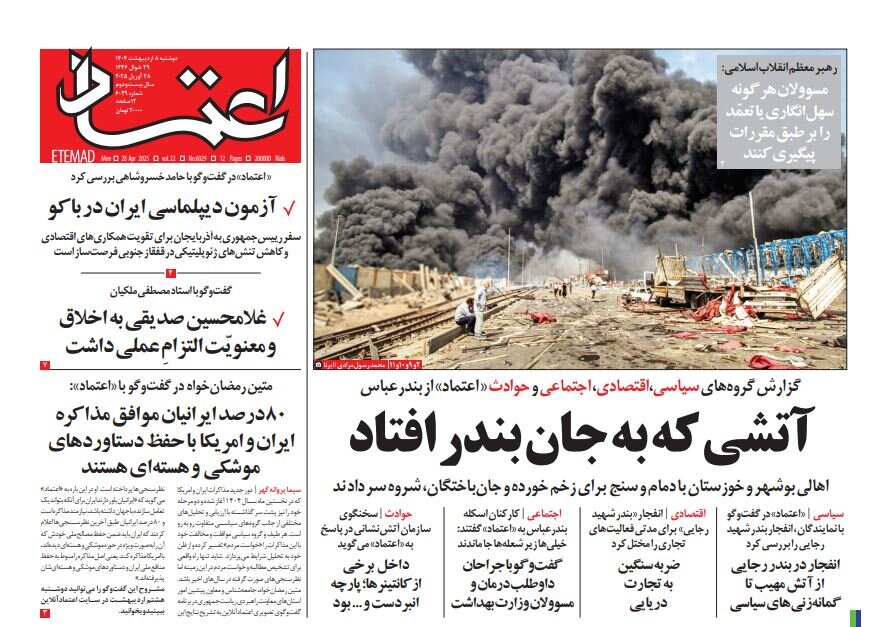Conflicting signals from Washington

TEHRAN - In a commentary, Etemad addressed the challenging conditions of the Iran-U.S. negotiations and wrote: A group of observers believe that Trump's unique instincts and his special negotiating style could possibly lead to a positive outcome, preventing war with Iran and weakening extremists in Washington and Tel Aviv.
Trump has realized in his second term that Netanyahu could be one of the biggest obstacles to an agreement with Iran. Now, if Trump continues to resist Netanyahu, warmongering Republicans, and some of his advisors, he may be able to reach a significant agreement with Iran. However, observers consider another variable affecting Donald Trump's approach to negotiations with Iran. Although Steve Witkoff led the U.S. delegation, as in the previous two rounds of talks in Oman and Italy, the appointment of senior State Department official Michael Anton as the chief of the U.S. technical team has once again prompted analysts to assess Trump’s real approach.
Arman-e-Melli: Trump is looking for achievement
In a note, Arman-e-Melli discussed Trump’s efforts to reach an agreement with Iran after his failure on the issue of tariffs. The paper said: What attracts attention amidst the comments of the negotiating officials, while emphasizing the complexity of the negotiations, are the data and codes that the Omani Foreign Minister announced after the third round of negotiations. While emphasizing the constructive nature of the talks, he announced that high-level negotiations would be held between the parties on May 3. Now, the suspicion comes to mind as to whether the Iranian and American presidents are going to meet, or whether the Iranian and American foreign ministers are set to sit for negotiations. Of course, some experts have also stated that since Trump has not been able to achieve success in tariff disputes with China, Canada, Panama, and other foreign policy priorities, he intends to reach a good agreement with Tehran to have an acceptable record that can be presented to the American public. Therefore, he needs an understanding with Tehran to make a deal.
Iran: Relationship with Africa should be purposeful
In an analysis, the Iran newspaper discussed the third Iran-Africa cooperation summit in Tehran and wrote: Africa is a collection of countries with huge economic, mineral, agricultural, political, and cultural capacities, which have prompted major powers to compete for influence in the continent. Given its needs and capacities, Iran can also play a role in the continent. From a political point of view, Africa, with 54 countries, enjoys a significant place in international forums such as the United Nations and the International Atomic Energy Agency. Cooperation with African countries can provide Iran with effective political support. Relying solely on governments and ignoring the role of the private sector has limited Iran's success in Africa. To gain a foothold in African markets and enjoy the capacities of the continent, we must develop our relations with selected African countries with more accurate knowledge, proper planning, and active participation of the private sector.
Shargh: The impact of regional tensions on Iran’s national security
Shargh devoted its headline to the increasing tension between India and Pakistan. It wrote: Any tension or conflict in the geopolitical sphere surrounding Iran, especially in a region where two nuclear powers such as India and Pakistan are present, will have direct and ripple effects on the national security of our country. Iran, as a country that shares borders with Pakistan and has established long-standing and strong economic, commercial, and cultural relations with India, cannot be indifferent to developments in this region. The escalation of the conflict between India and Pakistan, especially if it leads to a full-scale military confrontation, could create a wave of instability in the region that will directly affect Iran’s eastern borders. Given the highly volatile situation, Iran needs to play a mediating role. By accepting this role, Tehran can prevent the region from becoming a crisis center and protect its national interests and security from the adverse consequences of a potential conflict. This security motive drives Iranian foreign policy towards a more active approach to managing regional tensions.
Leave a Comment